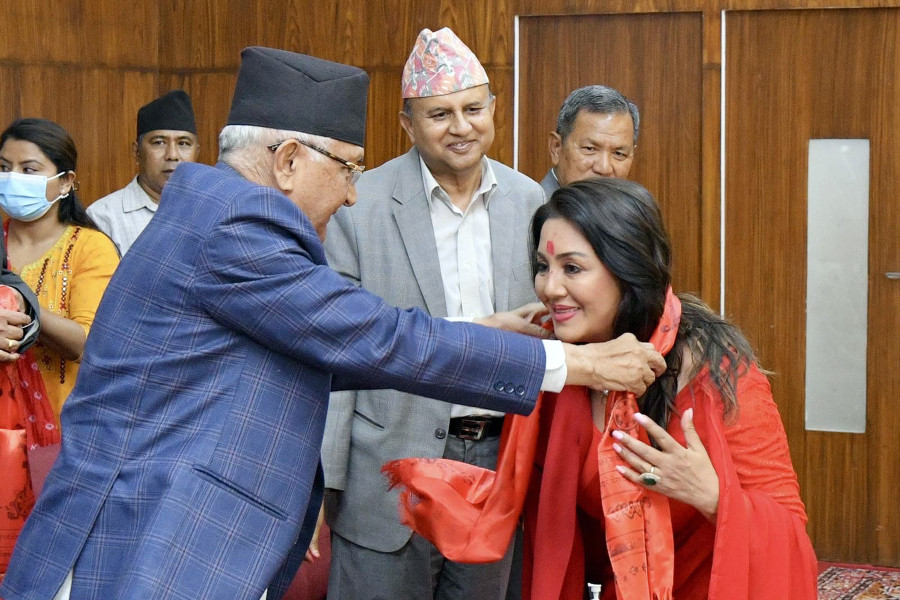Politics
This is poll season and party-hopping is rife
Quitting one party to join another is not unusual but an upward trend points to rise of opportunism, observers say.
Binod Ghimire
Prem Bahadur Singh started his politics from the Nepal Majdoor Kisan Party in Kalikot district during the Panchayat period. He was considered an influential leader in the party representing Karnali. After the restoration of democracy in 1990, Singh quit the party to join the CPN-UML. He was a National Assembly member from the UML in 1991. In the 1999 general elections he won a House of Representatives seat from Kalikot on the UML’s ticket.
In 2005, when king Gyanendra usurped power, Singh was quick to welcome the move.
When the House of Representatives was reinstated following the second people’s movement in 2006, the UML excluded him.
He quit the party and formed his own Samajbadi Janata Party. He was a member of both constituent assemblies under the proportional representation system.
His party couldn’t win a single seat in the 2017 general elections. Well aware of the fact that his party’s prospects in the upcoming elections are slim, Singh on Tuesday rejoined the UML.
He said he has returned home after 15 years.
“Everyone who has joined the UML will get a respectable position in the party,” said UML chairperson KP Sharma Oli at a function held to welcome the leaders and cadres from different parties. “No one will have to regret their decision to join the UML.”
Along with Singh, Karishma Manandhar, a movie actor who was once with Baburam Bhattarai’s Naya Shakti, Loktantrik Samajbadi Party leader Shiva Patel and Namgel Sherpa, a former Central Committee member of the CPN (Maoist Centre), among others, also joined the UML.
As 2022 is the year of elections and the local elections are inching closer, the trend of leaders and cadres deserting one party to join another has increased. Some have even switched parties in the span of a month.
Rajesh Man Singh, a leader of the Loktantrik Samajbadi Party, announced to have joined the UML last month. However, on Monday he left the UML and joined the Janata Samajbadi Party. He quit the UML after Vijay Sarawagi, a mayor of the Birgunj Metropolitan City and his rival, took the party’s membership.
The trend of joining the parties isn’t limited to the UML. Kedar Chhetri was an aspirant for chairperson for the UML’s Sindhupalchok district committee. A member of the party’s Provincial Committee, Bagmati, he quit the party and joined the Nepali Congress on March 8, as he didn’t get the position he had aspired to.
Number of cadres of the CPN-UML and Nepali Congress joined the CPN (Maoist Centre) on February 21. Not just in the major parties, the trend of changing parties has been seen in fringe parties like the Rastriya Prajatantra Party as well.
While which party to choose is within the prerogative of individuals, the trend shows politicians are leaving one to join another for their personal benefits, observers and analysts say. According to them, ideological issues have nothing to do with such people who hop to another party.
Tula Narayan Shah, a political commentator, says generally there are three types of politics: politics of struggle, politics of elections and the politics of power.
“Only the politics of struggle is guided by ideology and principle,” Shah told the Post. “Now the major focus of the leaders is the politics of elections and power.”
Party-hopping is not a new trend and it is not only limited to Nepal. Democracies in developing countries, where corruption is rampant, often see middle-ranked politicians switching parties frequently, observers say.
According to Shah, there has been a trend of quitting one party to join another just ahead of the elections, mainly when the country adopts a new political set-up. That happened in 1990 and during 2006-2007. Though the country adopted an entirely new political set-up before the 2017 elections, there wasn’t such a trend because some of the parties were still protesting and elections had happened amid confusion, according to him.
The Sanghiya Samajbadi Party and the Rastriya Janata Party hadn’t participated in the first and second phases of local elections demanding amendments to some of the provisions in the constitution that was promulgated in September 2015 amid reservations from some sections of society.
This year, Nepal will be holding three tiers of elections for the second time under the new constitution.
Experts say the current trend of defections also depicts the rise of opportunistic politics in the country.
“Opportunists don’t have an ideology or a principle. These people can quit one party to join another at the drop of a hat if the move serves their personal interests,” said Meena Vaidya Malla, a former professor of political science at Tribhuvan University. “This is the bane of the country and the political system.”
According to Malla, in Nepal, no one seems to be bothered about politics of principle.
“Politics has become a career for some for self-gain,” she said. “The leaders who are welcoming these defectors must not forget that if they can desert other parties then they can do so with their parties too.”
Observers say the UML may be seen as a party that’s welcoming more politicians from other parties because “it has more vacancies,” ahead of the local polls slated for May 13.
A section of leaders led by Madhav Kumar Nepal in August split from the UML and formed a new party—CPN (Unified Socialist).
At present, the UML is also the largest party.
“It is too early to predict if the UML will benefit in the upcoming elections from the recent entries of politicians from other parties,” said Shah, the commentator. “Much will depend on how pre-poll alliances are formed.”




 18.12°C Kathmandu
18.12°C Kathmandu















